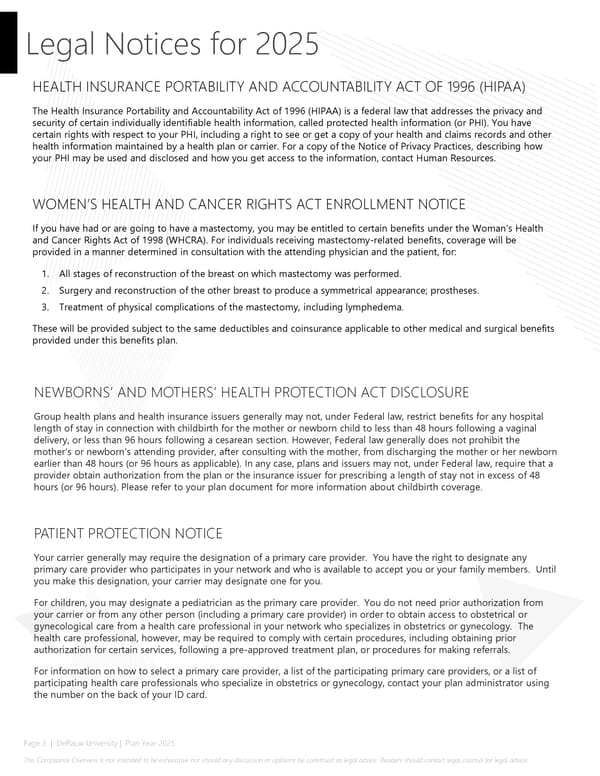Legal Notices for 2025 HEALTH INSURANCE PORTABILITY AND ACCOUNTABILITY ACT OF 1996 (HIPAA) The Health Insurance Portability and Accountability Act of 1996 (HIPAA) is a federal law that addresses the privacy and security of certain individually identifiable health information, called protected health information (or PHI). You have certain rights with respect to your PHI, including a right to see or get a copy of your health and claims records and other health information maintained by a health plan or carrier. For a copy of the Notice of Privacy Practices, describing how your PHI may be used and disclosed and how you get access to the information, contact Human Resources. WOMEN’S HEALTH AND CANCER RIGHTS ACT ENROLLMENT NOTICE If you have had or are going to have a mastectomy, you may be entitled to certain benefits under the Woman’s Health and Cancer Rights Act of 1998 (WHCRA). For individuals receiving mastectomy-related benefits, coverage will be provided in a manner determined in consultation with the attending physician and the patient, for: 1. All stages of reconstruction of the breast on which mastectomy was performed. 2. Surgery and reconstruction of the other breast to produce a symmetrical appearance; prostheses. 3. Treatment of physical complications of the mastectomy, including lymphedema. These will be provided subject to the same deductibles and coinsurance applicable to other medical and surgical benefits provided under this benefits plan. NEWBORNS’ AND MOTHERS’ HEALTH PROTECTION ACT DISCLOSURE Group health plans and health insurance issuers generally may not, under Federal law, restrict benefits for any hospital length of stay in connection with childbirth for the mother or newborn child to less than 48 hours following a vaginal delivery, or less than 96 hours following a cesarean section. However, Federal law generally does not prohibit the mother’s or newborn’s attending provider, after consulting with the mother, from discharging the mother or her newborn earlier than 48 hours (or 96 hours as applicable). In any case, plans and issuers may not, under Federal law, require that a provider obtain authorization from the plan or the insurance issuer for prescribing a length of stay not in excess of 48 hours (or 96 hours). Please refer to your plan document for more information about childbirth coverage. PATIENT PROTECTION NOTICE Your carrier generally may require the designation of a primary care provider. You have the right to designate any primary care provider who participates in your network and who is available to accept you or your family members. Until you make this designation, your carrier may designate one for you. For children, you may designate a pediatrician as the primary care provider. You do not need prior authorization from your carrier or from any other person (including a primary care provider) in order to obtain access to obstetrical or gynecological care from a health care professional in your network who specializes in obstetrics or gynecology. The health care professional, however, may be required to comply with certain procedures, including obtaining prior authorization for certain services, following a pre-approved treatment plan, or procedures for making referrals. For information on how to select a primary care provider, a list of the participating primary care providers, or a list of participating health care professionals who specialize in obstetrics or gynecology, contact your plan administrator using the number on the back of your ID card. Page 3 | DePauw University | Plan Year 2025 This Compliance Overview is not intended to be exhaustive nor should any discussion or opinions be construed as legal advice. Readers should contact legal counsel for legal advice.
 2025 DePauw Compliance Bundle Page 2 Page 4
2025 DePauw Compliance Bundle Page 2 Page 4